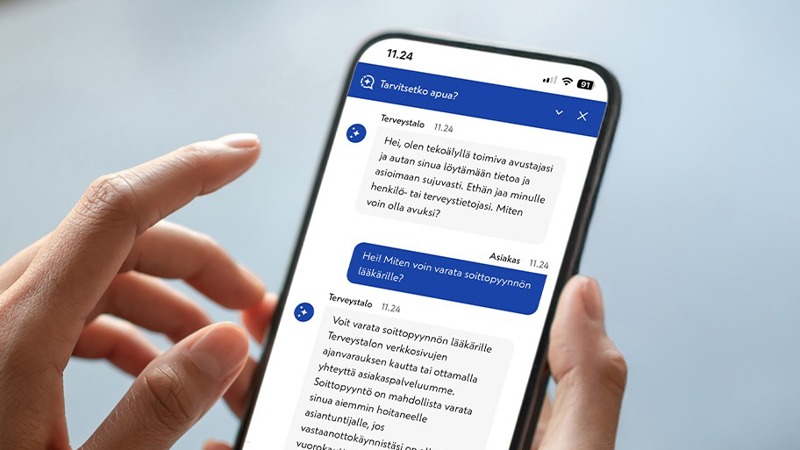True or false: sleep deprivation causes more road accidents than alcohol
True. There is also less awareness of the risk of accidents caused by sleep deprivation, which makes driving while tired insidiously dangerous. What level of drunkenness is equivalent to one night's sleep? Matleena Näppilä, occupational health physician at Terveystalo.

Research shows that a driver with untreated sleep apnoea has more than three times the risk of being involved in a road accident compared to a healthy driver. However, drugs are a slightly higher cause of fatal road accidents than fatigue.
– On the other hand, it is common knowledge that driving while intoxicated is illegal and dangerous. Most drivers are vigilant and act responsibly. There is less awareness of the increased risk of accidents due to fatigue and sleep deprivation. This makes driving while tired insidiously dangerous," says Matleena Näppilä, an occupational health physician at Terveystalo.
Sleep deprivation significantly slows down your ability to react on the road: one night of sleeplessness equals 0.6 parts per million drunk
When tired, people's perceptive abilities are impaired, their problem-solving ability slows down and reaction times increase.
– In other words, it takes longer to spot a moose on the roadside, for example, and then longer to take the right evasive action or brake," Näppilä explains.
In sleep, the brain cleanses itself of harmful metabolites, processes daytime stimuli and stores energy for the next day. Sleep plays an important role in maintaining the brain's metabolism and thus its cognitive abilities.
– After one night of sleep, performance is on a par with that of a 0.6 ppm drinker. This has been found by studying the cognitive impairment caused by both sleep deprivation and drunkenness.
Fatigue accidents are mainly encounter accidents: the co-driver reduces the risk
Sleep deprived driving is unstable and unsafe. When people with sleep deprivation are observed driving with a driving simulator, a significantly higher level of lateral protection of the car is observed.
– So the car is swaying sideways in the lane more than normal. According to the Accident Data Institute (OTI), fatigue accidents are mainly collisions, where a tired driver's car drifts out of his lane into oncoming traffic or, for example, a barrier on a kerb," says Näppilä.
The majority of fatigue accidents occur when the driver is alone in the car.
– Studies show that 71% of fatigue accidents involve a driver driving alone. This means that there was no co-driver to keep the driver alert and awake," Näppilä points out.
You shouldn't drive on less than six hours' sleep: recognise these symptoms
On average, an adult needs 7-9 hours of sleep a night.
– People have had enough sleep when they feel refreshed soon after waking up and the feeling of tiredness does not unduly restrict their daily activities, such as work and hobbies, Näppilä says.
Understanding your own sleep needs helps you assess the risk of getting on the road.
– If you know that you usually need eight hours of sleep to be alert and fit for work, you should not drive on less than six hours of sleep. For example, in a recent study by Juhani Kalsi, an independent risk factor for fatigue-related fatal crashes was found to be less than six hours' sleep.
After a bad night's sleep, you wake up tired and don't feel refreshed in the morning. Thought processes are slow and you may feel stiff and irritable.
– It makes sense to leave the car at home or go to the co-driver's place yourself. Even one bad night's sleep at the weekend, for example, is dangerous for driving. According to the OTI report, 76% of fatigue accidents occurred on a leisure trip.
There are many treatments for insomnia
– When insomnia persists for a long time and interferes with your everyday life, work and hobbies, you should seek medical advice. If you suddenly lose all sleep at night, you should also have a more detailed assessment. There are many medical and non-medical treatments for insomnia," Näppilä says.
Read more articles

What is metabolic age and why should you care about it?
A new laboratory study by Terveystalo reveals how your body is aging. Metabolic age makes biological aging visible.

Smooth assistance for your needs – our AI assistant is now at your service
You can now find Terveystalo’s AI assistant on our website — a quick and easy way to get answers based on the information available on our site. For now, the assistant is available only on the Finnish‑language section of our website, but you can chat with it in English.

How technology helps relieve mental stress: "When the load is high, the threshold must be low."
Mental health disorders have overtaken musculoskeletal disorders, which had long been the leading cause of sick leave. Work is changing, and the range of sick leave caused by mental health issues has also changed. We must be able to offer new solutions to this challenge.

Extensive data set of 200,000 samples: Nightingale study reveals link between illness risks and sick leave
Data from the Finnish Nightingale study, which is used in Terveystalo's occupational health services, reveals a clear link between lifestyle-related health risks and sick leave. The exceptionally extensive data set of over 200,000 customers shows that people with a low risk of illness had significantly fewer absences, while those in high-risk groups had more absences. The results highlight the importance of preventive healthcare in ensuring work ability and the competitiveness of companies.

Strong identification speeds up your service experience when calling us
Soon you can identify yourself easily and securely before your call is answered. Read below to see how the identification process works.

Terveystalo's digital services have been awarded the internationally recognized ISO27001 information security certification.
Terveystalo's information security practices, processes, and risk management are in line with international best practices.